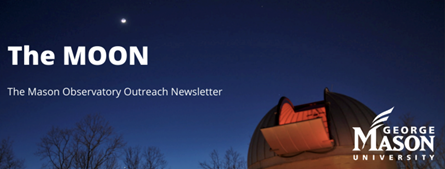NOVAC General Meeting
Join NOVAC Astronomers
at GMU or Online
March 9, 2025
NOVAC Public Meeting, Dr. Alan P. Boss presents Are there planets like Earth around other stars? March 9, 2025, 7:30 pm EST
This talk will summarize the history of the search for exoplanets, beginning in 1938, and leading to NASA’s plans for the Habitable Worlds Observatory, a space telescope planned for launch around 2045, intended to detect and characterize Earth-like worlds. This is a virtual presentation by Dr. Boss –Join your colleagues at GMU or join him
NOVAC Public Meeting, Dr. Gioia Rau presents Cosmic Journeys: Unveiling the Secrets of Cool Evolved Stars and the Hunt for Exoplanets, 2/9/2025, 7:30 pm EST
In this talk, we will embark on a cosmic journey to explore the fascinating lives of cool evolved stars and their pivotal role in shaping the universe. These stars, in their later stages of evolution, offer unique insights into stellar physics, chemical enrichment, and the cosmic recycle of matter. We will also dive into the
NOVAC Public Meeting, NOVAC Swap Meet, 12/8/2024, 7:30 pm EST
Come to George Mason for the NOVAC monthly meeting and bring along any astro gear that you would like to trade or sell or give to other NOVAC members. Doors to the meeting room will open at 7 PM. For those who chose to not venture out in the cold, the Google meet connection
NOVAC Public Meeting, Dr. Carl Rodriguez presents The Dark Side of the Universe, 11/10/2024, 7:30 pm EST
On September 14th, 2015, the two sites of the Laser Interferometer Gravitational-wave Observatory detected minuscule ripples in the fabric of space. This Nobel-winning accomplishment, the culmination of nearly 50 years of work, also provided us with a new window into the Universe: gravitational waves. I will discuss some of the first results from LIGO, and
NOVAC Public Meeting, Dr. Robert Smith presents The Herschels: A Most Astronomical Family and the Transformation of Astronomy, 10/13/2024, 7:30 pm EDT
Dr. Robert Smith from the University of Alberta will present: The Herschels: A Most Astronomical Family and the Transformation of Astronomy. In the late eighteenth and early nineteenth centuries, professional astronomers who worked at official observatories focused on the motions of astronomical bodies. The stars were generally only of interest as they provided a background grid




You must be logged in to post a comment.